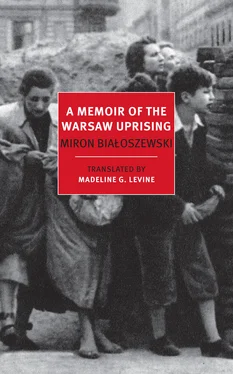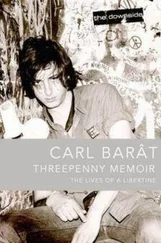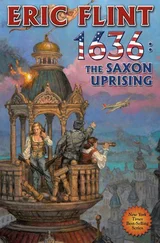The first person from the uprising whom I saw suddenly one evening near a kiosk in Częstochowa was Swen’s mother, and the second was Swen, who was holding her by her arm. A couple of months later I saw Stefa, who was preparing to go abroad.
I saw what remained of Warsaw in February 1945.
— MADELINE G. LEVINE
Chapel Hill, North Carolina, and Stevensville, Montana
A GUIDE TO THE PRONUNCIATION OF POLISH NAMES
As a rule, Polish names are stressed on the penultimate syllable. Polish letters with approximate English equivalents:
c
ts
cz
ch
j
y
ł
w
rz
zh
sz
sh
w
v
a
ah
ą
nasalized o
e
eh
ę
nasalized e
i
ee
o
oh
ó, u
oo (as in soon)
y
i (as in if)
A MEMOIR OF THE WARSAW UPRISING
TUESDAY, August 1, 1944, was overcast, wet, not too warm. It must have been about noon when I stepped out onto Chłodna Street (my street at the time, number 40), and I remember that there were a lot of trams, cars, and people, and that right after I reached the corner of Żelazna Street I became aware of the date — August 1— and I thought to myself, more or less in these words: “August 1—it’s Sunflower Day.”
I remember looking down Chłodna Street in the direction of Kercelak. But why the association with sunflowers? Because that’s when they’re blooming and even shedding their petals, because they’re ripening… And also because at that time I was more naive and sentimental, I hadn’t become cunning yet, because the times themselves were also naive, primitive, rather carefree, romantic, conspiratorial, wartime… So — that yellow color must have been in something — the light of the inclement weather with sunlight struggling to break through (it did) on the trams painted red as they are in Warsaw.
I shall be frank recollecting my distant self in small facts, perhaps excessively precise, but there will be only the truth. I am forty-five years old now, twenty-three years have gone by, I am lying here on my couch safe and sound, free, in good health and spirits, it is October, night, 1967, Warsaw once again has 1,300,000 inhabitants. I was seventeen years old when I went to bed one day and for the first time in my life heard artillery fire. It was the front. And that was probably September 2, 1939. I was right to be terrified. Five years later the all too familiar Germans were still walking along the streets in their uniforms.
(I am using the designation “Germans” here and elsewhere because any other usage will sound artificial. Just as at that time the Vlasovites were often assumed to be Ukrainians.[1] We knew that the Germans weren’t the only Hitlerites. We even saw it. I remember the Latvians in 1942 after the liquidation of the little ghetto. With rifles. Entirely in black. They were standing along the length of Sienna Street. Close together. On the Aryan sidewalk. And for entire days and nights they scanned the windows on the Jewish side of Sienna. The remains of windowpanes in their frames, plugged up with quilts. Deathly goose down. Along the street — that one street — from Żelazna to Sosnowa ran not a wall but barbed wire. Along its entire length. The roadway, the cobblestones — on that side tall reeds and goosefoot were already growing — had dried out by then and turned as gray as charcoal. And yet they were crouching. That’s how they took aim. And I remember that one of them fired every so often. At those windows.)
Well, that August 1, at about two in the afternoon, Mama said that I should go get some bread from Teik’s cousin on Staszic Street; apparently, there wasn’t enough bread and they had arranged something. I went. And I remember that when I returned there were a great many people and there was already a commotion. And people were saying, “They killed two Germans on Ogrodowa Street.”
It seems to me that I didn’t go the way I should have because right away they were rounding up people, but somehow it also seems that I really did take Ogrodowa Street. My commotion in Wola may have been only local because right afterward I ran into Staszek P., the composer, and afterward Staszek laughed and said, “And my mother said that today was such a peaceful day!”
Staszek himself had seen many tigers. “Tanks as big as apartment houses.”
So they were cruising around. Someone had seen a thousand people (ours) on horseback, riding up to 11 Mazowiecka Street. Various things were happening. And it wasn’t even five o’clock, or “W” hour, yet. Staszek and I were supposed to go to 24 Chłodna Street to see Irena P., my colleague at the secret university. (Our Polonistics department was located on the corner of Świętokrzyska Street and Jasna, on the third floor; we sat on school benches; it was referred to as Tynelski’s school of commercial studies.) Well, we were supposed to be at her place by five (I had a date at seven with Halina, who was living with Zocha and my father at 32 Chmielna Street), but since it was early we walked along Chłodna from Żelazna to Waliców and back. The sexton had spread a carpet on the church steps and set out potted green trees for a formal wedding. Suddenly we see that the sexton is removing everything, rolling up the carpet, carrying in the potted trees, rushing to get it done, and this surprised us. In fact, the day before — July 31, that is — Roman Ż. had dropped in to say goodbye to us. At that moment the Soviet front could be heard distinctly, explosions and simultaneously the planes dropping their bombs on the German districts. So we went into Irena’s. It was before five. We’re talking, suddenly there’s shooting. Then, it seems, heavier weapons. We can hear cannons. And all sorts of weapons. Finally a shout, “Hurrahhh…”
“The uprising,” we told each other immediately, like everyone else in Warsaw.
Strange. Because no one had ever used that word before in his life. Only in history, in books. It was boring. But now, all of a sudden… it’s here, and the sort with “hurrahhhs” and the thundering of the crowd. Those “hurrahhhs” and the thundering were the storming of the courthouses on Ogrodowa. It was raining. We observed whatever could be seen. Irena’s window looked out onto a second courtyard with a low red wall at the end, and beyond this wall was another courtyard, which extended all the way to Ogrodowa Street and housed a sawmill, a shed, a pile of boards, and handcarts. We’re standing there watching and then someone in a German tankist’s uniform, I think, wearing a forage cap and an armband, leaps across that low red wall from the other courtyard into ours. He jumps down onto the lid of our garbage bin. From the bin onto a stool. From the stool onto the asphalt.
“The first partisan!” we shouted.
“You know what, Mironek, I could give myself to him,” Irena told me ecstatically through the curtain.
Immediately afterward people ran into that courtyard from Ogrodowa Street and began grabbing the wagons and carts to use as barricades.
Then — I remember — after Staszek cooked dumplings and we ate them, we played a game, thumbed through Rabelais’s Gargantua (my first contact with him). Then we went to sleep. Of course, it wasn’t quiet. The whole time. Only the large-caliber guns, which became so familiar later on, quieted down a little. So Irena went to sleep in her room. And Staszek and I lay down on her mother’s bed in her mother’s room, since of course she had not come home from the center. It was raining. Drizzling. It was cold. We could hear machine guns, that rat-a-tat-tat. Nearer burst, then farther off. And rocket flares. Every so often. In the sky. We fell asleep to their noise, I think.
Читать дальше












